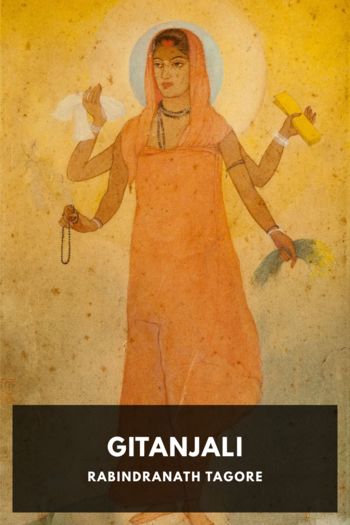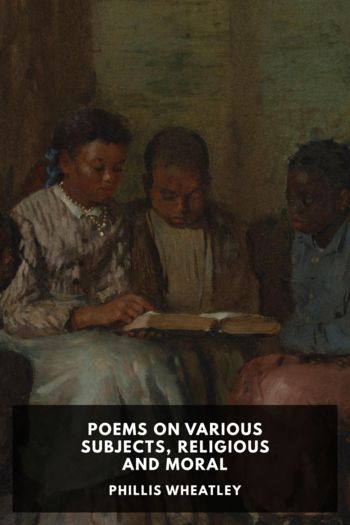My Reminiscences by Rabindranath Tagore (free children's ebooks pdf .TXT) 📕

- Author: Rabindranath Tagore
Book online «My Reminiscences by Rabindranath Tagore (free children's ebooks pdf .TXT) 📕». Author Rabindranath Tagore
After a short time a porter came and informed me that a special was running and would be in in half an hour. I felt so cheered up by the news that I could not go on any longer with the Data of Ethics. Where I was due at seven I arrived at length at nine. “What is this, Ruby?” asked my hostess. “Whatever have you been doing with yourself?” I was unable to take much pride in the account of my wonderful adventures which I gave her. Dinner was over; nevertheless, as my misfortune was hardly my fault, I did not expect condign punishment, especially as the dispenser was a woman. But all that the widow of the high Anglo-Indian official said to me was: “Come along, Ruby, have a cup of tea.”
I never was a tea-drinker, but in the hope that it might be of some assistance in allaying my consuming hunger I managed to swallow a cup of strong decoction with a couple of dry biscuits. When I at length reached the drawing room I found a gathering of elderly ladies and among them one pretty young American who was engaged to a nephew of my hostess and seemed busy going through the usual premarital love passages.
“Let’s have some dancing,” said my hostess. I was neither in the mood nor bodily condition for that exercise. But it is the docile who achieve the most impossible things in this world; so, though the dance was primarily got up for the benefit of the engaged couple, I had to dance with the ladies of considerably advanced age, with only the tea and biscuits between myself and starvation.
But my sorrows did not end here. “Where are you putting up for the night?” asked my hostess. This was a question for which I was not prepared. While I stared at her, speechless, she explained that as the local inn would close at midnight I had better betake myself thither without further delay. Hospitality, however, was not entirely wanting for I had not to find the inn unaided, a servant showing me the way there with a lantern. At first I thought this might prove a blessing in disguise, and at once proceeded to make inquiries for food: flesh, fish or vegetable, hot or cold, anything! I was told that drinks I could have in any variety but nothing to eat. Then I looked to slumber for forgetfulness, but there seemed to be no room even in her world-embracing lap. The sandstone floor of the bedroom was icy cold, an old bedstead and worn-out washstand being its only furniture.
In the morning the Anglo-Indian widow sent for me to breakfast. I found a cold repast spread out, evidently the remnants of last night’s dinner. A small portion of this, lukewarm or cold, offered to me last night could not have hurt anyone, while my dancing might then have been less like the agonised wrigglings of a landed carp.
After breakfast my hostess informed me that the lady for whose delectation I had been invited to sing was ill in bed, and that I would have to serenade her from her bedroom door. I was made to stand up on the staircase landing. Pointing to a closed door the widow said: “That’s where she is.” And I gave voice to that Behaga dirge facing the mysterious unknown on the other side. Of what happened to the invalid as the result I have yet received no news.
After my return to London I had to expiate in bed the consequences of my fatuous complaisance. Dr. Scott’s girls implored me, on my conscience, not to take this as a sample of English hospitality. It was the effect of India’s salt, they protested.
XXVI Loken PalitWhile I was attending lectures on English literature at the University College, Loken Palit was my class fellow. He was about four years younger than I. At the age I am writing these reminiscences a difference of four years is not perceptible. But it is difficult for friendship to bridge the gulf between seventeen and thirteen. Lacking the weight of years the boy is always anxious to keep up the dignity of seniority. But this did not raise any barrier in my mind in the case of the boy Loken, for I could not feel that he was in any way my junior.
Boy and girl students sat together in the College library for study. This was the place for our tête-à-tête. Had we been fairly quiet about it none need have complained, but my young friend was so surcharged with high spirits that at the least provocation they would burst forth as laughter. In all countries girls have a perverse degree of application to their studies, and I feel repentant as I recall the multitude of reproachful blue eyes which vainly showered disapprobation on our unrestrained merriment. But in those days I felt not the slightest sympathy with the distress of disturbed studiousness. By the grace of Providence I have never had a headache in my life, nor a moment of compunction for interrupted school studies.
With our laughter as an almost unbroken accompaniment we managed also to do a bit of literary discussion, and, though Loken’s reading of Bengali literature was less extensive than mine, he made up for that by the keenness of his intellect. Among the subjects we discussed was Bengali orthography.
The way it arose was this. One of the Scott girls wanted me to teach her Bengali. When taking her through the alphabet I expressed my pride that Bengali spelling has a conscience, and does not delight in overstepping rules at every step. I made clear to her how laughable





Comments (0)